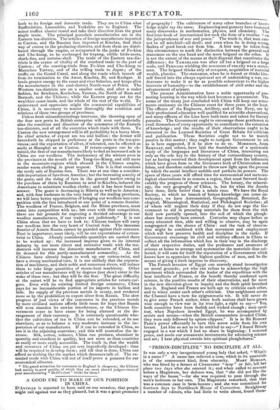A GOOD USE TO MAKE OF OUR POSITION IN CHINA.
D'ANVILLE is reported to have said on one occasion, that people might rail against war as they pleased, but it was a great promoter of geography I The cultivators of many other branches of know- ledge might say the same. Engineeringand gunnery have hastened many discoveries in mathematics, physics, and chemistry. The first text-book of international law took the form of a treatise "on the jurisprudence of war and peace." The truth is, that man can- not be all mischief—all devil; and even when he is doing wrong, flashes of good break out from him. A hint may be taken from this circumstance to mark the distinction between the general and statesman on the one hand and the mere brigand on the other. It is not the extent of the means at their disposal that constitutes the difference; for TAMARLANE was after all but a brigand on a large scale, and PERICLES wielding the resources of one city was a states- man. The brigand thinks only of conquest, acquisition of material wealth, plunder. The statesman, when he is forced or thinks him- self forced into the always equivocal act of undertaking a war, en- deavours to make it as far as possible subservient to the higher interests of humanity—to the establishment of civil order and the advancement of science.
The present Administration have a noble opportunity of pro- moting learning in the way which best becomes a government. The terms of the treaty just concluded with China will keep our arma- ments stationary on the Chinese coast for three years at the least. The officers of the Engineers, Artillery, and of the Navy, are by their professional education well qualified for scientific observations, and many officers of the Line have both taste and talent for literary pursuits. The Government ought to encourage those gentlemen to avail themselves of every opportunity to contribute to the extension of knowledge ; and the results of their observations ought to be intrusted to the Learned Societies of Great Britain for criticism and publication. These Societies ought not to be merely passive in this matter ; they ought to instigate Government to act as is here suggested, if it be slow to do so. Moartmon, REMOSAT, and others, have laid the foundations of a systematic study of the languages and literatures of China, interesting not only as the sole key to the history of that extraordinary country, but as having received their development apart from the influences which have given form to the literatures both of Christendom and Islam, and therefore calculated to throw new light upon the process by which the social intellect unfolds and perfects its powers. The space of three years will afford time for astronomical and meteoro- logical observations in so remote a region, that must forward incal- culably the progress of those sciences. The botany, the mineral- ogy, the very geography of China, is, but for what the Jesuits have done, little better than a tabula rasa. We have the Royal Society, to which no branch of human knowledge can come un- welcome; we have Astronomical, Geographical, Botanical, Zo- ological, Mineralogical, Statistical, and Philological Societies; all of whom will neglect their duty if they do not urge the Go- vernment to aid in procuring materials for them from the rich field now partially opened, into the soil of which the plough- share has scarcely been entered. Centuries may elapse before so many educated men, able and willing to observe, may be again congregated on the shores of China : and the task of observa- tion might be combined with that movement and employment which will best preserve health and discipline in the ranks. If Government encourage its civil and military officers in China to collect all the information which lies in their way in the discharge of their respective duties, and the professors and amateurs of science at home to arrange and systematize the materials thus col- lected, it will earn for itself the reputation of a Government which knows how to appreciate the highest qualities of man, and be the means of giving a fresh impetus -to discovery.
The French invasion of Egypt can scarcely stand investigation on moral grounds; yet who can refuse to acknowledge the high sentiment which surrounded the leader of the expedition with the best intellects of France, or the benefit thereby conferred upon science, in the positive results of their observations, and far more in the new direction given to inquiry and the fresh spirit breathed into it. England and France are both apt to criticize each other, and to wince under each other's criticism. Our neighbours across the Channel have a turn for epigrammatic wit. It will never do
to give some French author, when both nations shall have grown wise enough to view war in its true light, a right to say—" Yes, both countries have been foolish and wicked enough ; mais apris tout, when Napoleon invaded Egypt, he was accompanied. by artists and savans—when the British commanders invaded China, they were only followed by opium-clippers." It is in Sir .ROBERT PEEL'S power effectually to turn this arrow aside from his own breast. Let him so act as to be entitled to say—" I found Britam engaged in a war which I bad no share in beginning: I restored peace, and made our armaments instruments for advancing science and art; I beat physical swords into spiritual ploughshares."


























 Previous page
Previous page